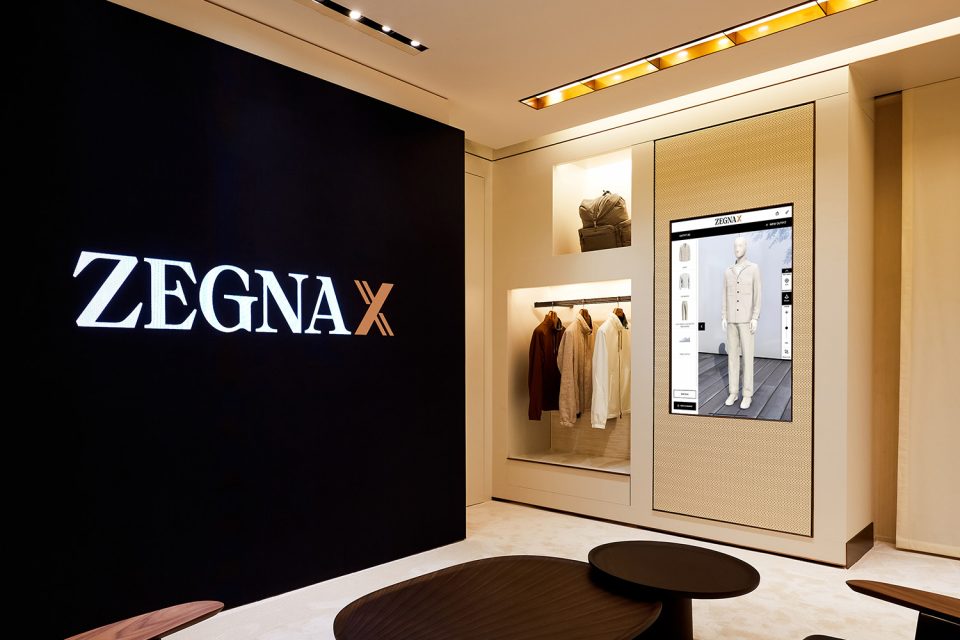Since 1910, the Italian fashion house Zegna has built its reputation on high-quality fabrics, particularly cashmere and wool, and a refined expression of elegance for men.
The company’s latest moves are accelerating its commitment to meeting the needs of clients where they live – which is more and more in the digital domain.
Zegna unveiled an upgraded version of its ZEGNA X system developed with Microsoft technology that personalizes the shopping experience using data tools and artificial intelligence (AI).
ZEGNA X 360 connects style consultants with customers online. The system allows for a personalized shopping experience using a 360 “configurator” that makes it possible to see how different combinations of clothing work together. The company also announced it was investing further in its relationship with Microsoft and working together to find ways to use AI in other aspects of its operations.
After a two-year trial period, the ZEGNA X system has already accounted for about 45 percent of revenue from Zegna boutiques, according to Edoardo Zegna, chief marketing, digital and sustainability officer of ZEGNA Group. Clients can order custom-tailored clothing and have the clothes delivered anywhere within four weeks, sometimes less.
We spoke to Zegna about how he sees the company adopting AI and other technologies to improve its client service, efficiency and commitment to sustainability. The conversation has been edited for clarity and length.

Did you imagine 10 years ago you would be doing this kind of bespoke tailoring using digital tools?
If you go back 15 years, there was this idea of luxury brands having a status or an ego. … There was this idea of ‘I am luxury, I am fashion, I’ll decide if I want to let you in or not.’ It made you almost intimidated to walk into a store.
I think this has shifted completely. I think the idea that we should be waiting for the customer is completely obsolete. Instead, we should be trying to be part of his life, and if we want to be part of his life we need to try to understand how he lives, what he likes, how he likes to be contacted.
Style consultants used to keep this information in a little notebook. The big shift happened 10 to 15 years ago when luxury companies decided to become data companies, creating ways to reach the customer as well as creating products for a specific customer.
How do you maintain the idea of luxury in the digital sphere?
It’s very personal contact. It’s less intimidating, it’s more like a connection you’re making. The way I like to see it is that there is a difference between “service” and “clientelling.” Service is about getting a product from place A to place B. Clientelling is about how are you going to make the customer feel unique, how are you going to make him feel important?
Zegna was one of the first fashion brands to embrace sustainability as an ethos, and to look for ways to cut waste. How does the use of new technology fit into that?
One of the reasons we’re working with Microsoft is how we can have AI help streamline and personalize.
Being able to predict at a higher rate the products that a customer may need will clearly create less waste. Ultimately transportation will happen way less. Instead of shipping clothing from a warehouse to the store, they can just ship from the warehouse.
How to make things sustainable goes through the entire value chain of the product. How can we be more and more net zero on the creation of every single product? That can extend to the way fabric is cut and to how waste fabric and thread can be reused.
What are your hopes for how AI could improve your operations?
Currently, we use Azure to do all our CRM (customer relation management), data gathering, reporting, analytics and predictive analytics as a whole. We will be moving all our IT infrastructure into the cloud starting in July.
But I think the next stage, and that is why we’re making this announcement, and this is why we’re working closely with Microsoft, is the next stages of personalization. … how do we improve the relationship with the customer. What is the likelihood of them responding to a short text or rather a long text? What sort of images do they respond to?
Lastly, we have committees working around production. How can we improve the efficiency of all of that based on timings of deliveries, optimization of spaces and so forth. AI is very much the future of basically every single industry I would say.
Is there a contradiction between Zegna’s dedication to its traditions and using cutting-edge technology?
I would say absolutely not. Ultimately there is magic in luxury, or in clothing, or in anything artistic. There is the power of emotion. And that emotion cannot be synthesized from an algorithm. It’s something that you have to give – on top of the sheer data that you have. The secret and the success are the combination of art and science. One doesn’t replace the other.
Top image: A virtual “fitting room” where customers can try on clothes in the virtual world. Photo by Zegna.



